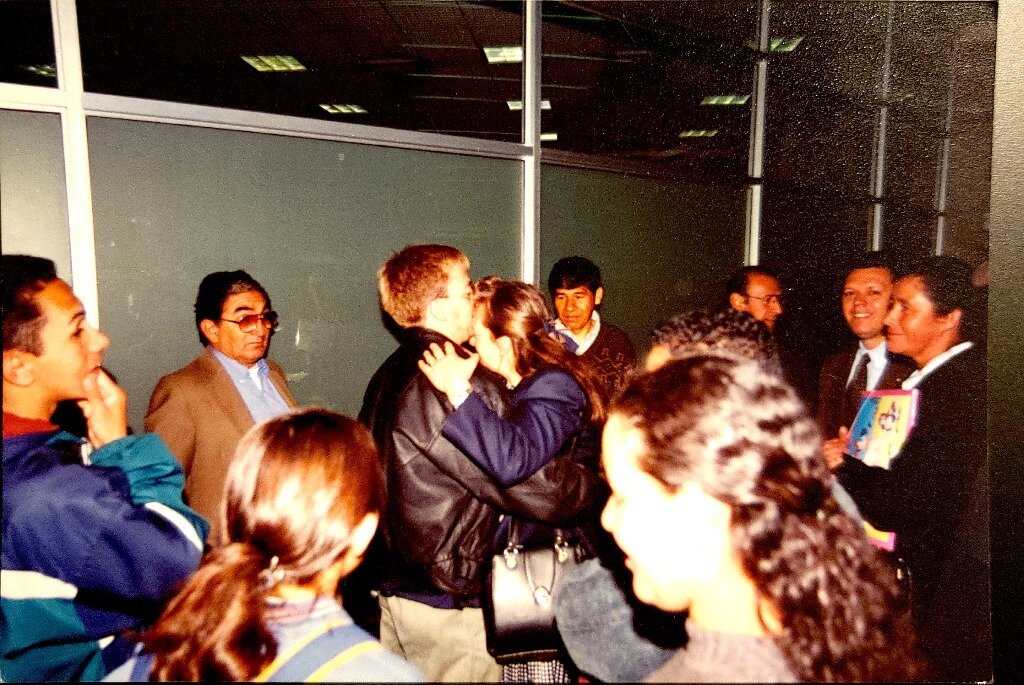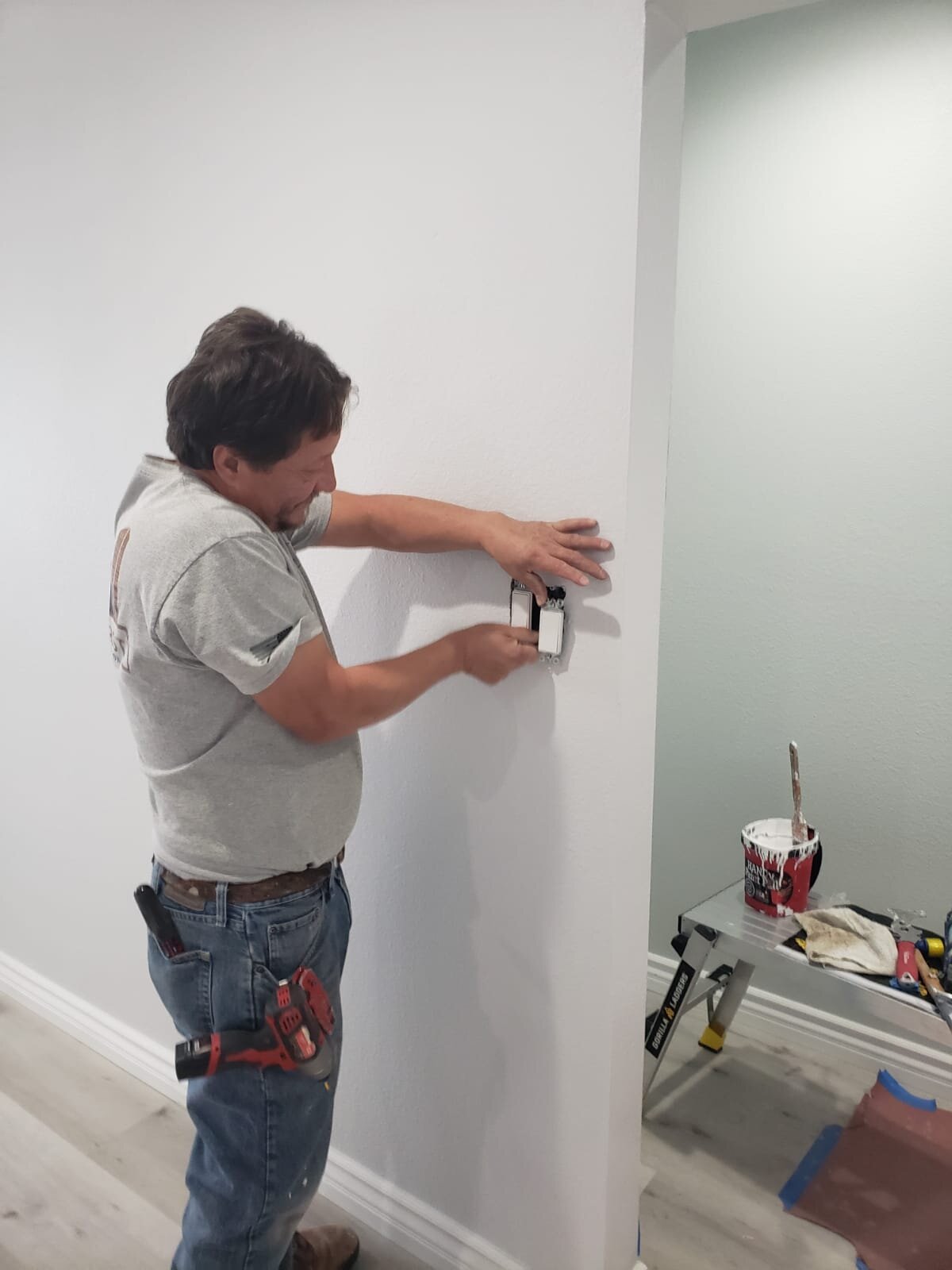Every Immigrant’s Fight
By: Esteban Barrera
Edgar saying goodbye to his mother and friends.
It was a warm Thursday morning on Aug. 2, 2020. A young immigrant couple named Edgar and Monica, along with their two small boys had neatly packed their essentials into three packed bags the night before. Yet what could possibly be considered essential in a situation like this? They could not possibly fit all of their memories into those three small bags. How does someone say goodbye to everything they have known all their life? All of their family, their friends, the streets they have walked all their life, the restaurants they used to eat, places they used to visit; so many things they never consider to be a part of your life until they have to leave them behind. This seems to be a universal burden that all immigrants seem to carry, especially all of the parents that are wanting to give their kids and their future generations a better life.
Edgar’s first picture in the United States.
Most immigrants do not have a VISA, so they resort to sneaking into the United States through Mexico by coyotes, which are people who sneak in immigrants from Mexico into the United States, or by caravans where they are smuggled with another family. Edgar’s family was forced to travel from Colombia to Mexico by car, and from Mexico they were smuggled to the United States by car. Edgar’s family arrived in Los Angeles on Aug. 3 and approximately six months later his wife gave birth to their third son in Beverly Hills Hospital.
Edgar's oldest son, Juan, on his first day of school in the United States.
Just like any other immigrant family, starting their new life in a new and foreign country is extremely difficult for them. None of them knew any English and they did not have any English-speaking friends to help them translate.
As seen in the figure below, this situation is all too familiar for the majority of immigrants who come to the United States from foreign, non-English speaking countries.
Edgar had always been a salesman in Colombia, so his first job in the United States was as a salesman at a dealership that was located next to the 5 Freeway in LA. He quickly learned basic English phrases that salesmen would use in order for him to do his job. His wife, Monica, was forced to clean their local church so she could help bring another source of income since their jobs did not pay well. Edgar’s family ended up living in Los Angeles for six years, and then they decided to move to Rialto where Edgar could start working on construction with a friend of his. Unfortunately, due to his illegal status and language barrier, he could not really work with people who only spoke English or that did not trust an immigrant to do their work. Consequently, Edgar had to rely on friends who needed help with house projects, and from there, his work spread by word of mouth with their friends, and slowly his reputation started to grow across the community. Even though his clientele grew steadily, it was too slow so his wife had to take on two jobs so that she could provide economic support.
Edgar's sons' first night in the United States.
It is common for either one parent to work multiple jobs, or if the situation is worse, both immigrant parents will take on multiple jobs. This occurs because their illegal status denies them an opportunity to receive the same job opportunities that normal American citizens are offered and so immigrants end up taking on jobs that pay much less than the average salary. According to Forbes magazine, the average salary an American citizen makes in California is approximately 27% more than what an immigrant makes (Forbes). In other words, if an American citizen earns around $52,000 a year, that means that an immigrant will earn $40,000 a year. Despite the gap in annual income, undocumented immigrants are still taxed the same amount as American citizens.
According to AmericanEconomy, “Hispanic households are estimated to contribute $139 billion in federal taxes and almost $76 billion in state and local taxes. That means that in total, Hispanics pay $215 billion in taxes each year.”
The reality is that most illegal immigrants are not allowed to receive their tax returns. This common misconception of immigrants not paying taxes was finally debunked due to the recent studies showing the billions of dollars in taxes that immigrants pay across the United States. As you can see from the graph above, it is seen how much immigrants really contribute to the United States' economy.
Another facet that immigrants struggle with is the acclimation to a new culture in which they have no knowledge. Most immigrants, whatever nation and culture they come from, share the same struggle to adapt to the American culture. My family is from Colombia, so in our culture, we tend to be very close as a family. Wherever someone may be, whether they are buying groceries or eating at a restaurant or even with their neighbors, everybody knows everybody and we are all close friends. There is this sense of community in our culture, however, when we came to the United States we noticed that there really is not that in the American culture. Not to say that kindness does not exist between Americans, but it is more common to see a sense of individuality in Americans, even within American families. I had a friend whose family is American, and they invited me to their house. Compared to Colombian traditions, my friend's family didn't sit down to eat together. Instead, each of them ate at different times and places and I noticed that they did not take a moment where there was a sense of bonding or closeness. I found this sense of individuality to be very distinct from what I am accustomed to in my own culture. It allowed me to feel empty eating by myself. Normally, I'm used to the warmth of my family and the silly conversations we have as we eat together in one place. Now, as I have grown older I have accustomed to many American traditions but this tradition will always be preserved in our household.
First time Edgar and his family tried In-n-out.
My family has lived in the United States for over 20 years. To put it into context, my mom has lived in the United States the same amount of years that she has lived in her own country. In spite of this, she still must remain in the shadow of her illegal status, just like Edgar and many other immigrants. These immigrants are not able to receive the same job opportunities or even the same academic privileges as someone who was born in the United States. According to PewResearch, studies conducted in 2018 showed that the percentage of immigrants who had a bachelor’s degree was around 18% and those who had undergraduate degrees were around 13%.
The small percentage of immigrants who have a bachelor’s or at least a vocational certificate is because of President Obama’s institution of DACA, or Deferred Action for Childhood Arrivals. Most of the DACA recipients, if not all of them, are millennials who have lived all their lives in the United States. My brothers are a living testament to what it is like to live in this nation as a Dreamer. Those who are DACA recipients have a social security, worker’s permit, a few benefits for education, but are still not given the opportunity to receive citizenship or even just a residency. Some politicians, and even President Trump, refuse to offer citizenship to DACA recipients when all DACA recipients have proved that their legal presence is deemed worthy due to their clean records and good merit in the United States. DACA recipients cannot even have too many traffic tickets because that will be enough to remove them from being eligible for DACA. The United States is a nation that stands for freedom, equality and justice for all. Despite these declarations that every American proudly stands by, it seems to be non-existent for people that are not from this country yet they have lived their entire lives here. Recent studies have shown that immigrants contribute greatly to the economy of the United States, sometimes even more than its own American citizens.
Edgar's son, Pablo, became the first in the family to attend college and graduate from a university.
According to the U.S. Bureau of Labor Statistics, “In 2018, the labor force participation rate of foreign-born adults was 65.7 percent, higher than the 62.3 percent rate for the native-born.”
With all of the statistics and studies showing how crucial immigrants are to this nation, they are still treated as lesser people. I know it may sound quite critical to say this since the United States gives a better life to immigrants than most other countries; however, once people have placed themselves in an immigrant’s shoes and really experience the hardships and discrimination that they must endure on a daily basis, then they will understand why immigrants fight for their inalienable human rights as well as the rights are given to a citizen of the United States of America.











